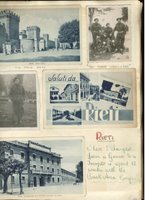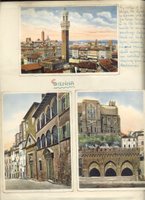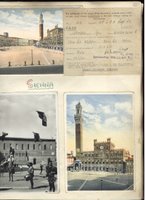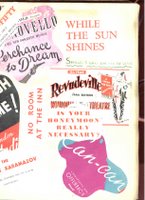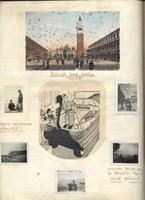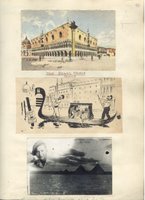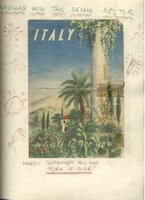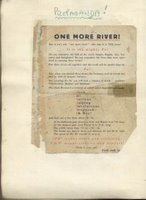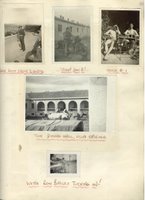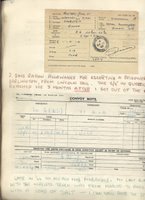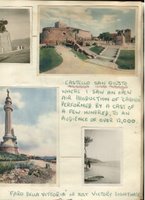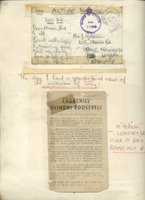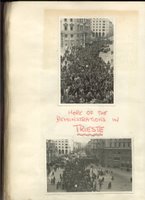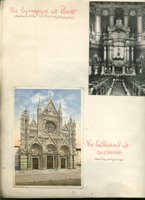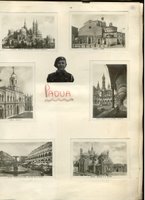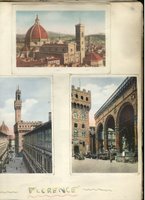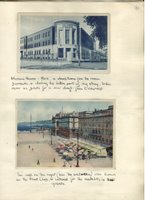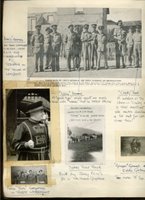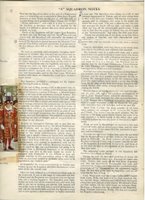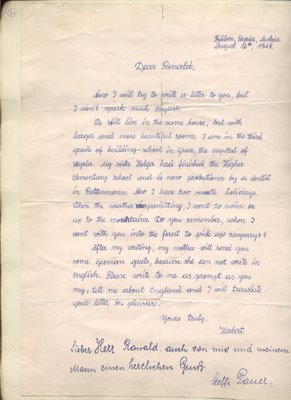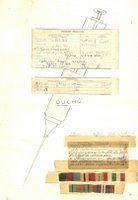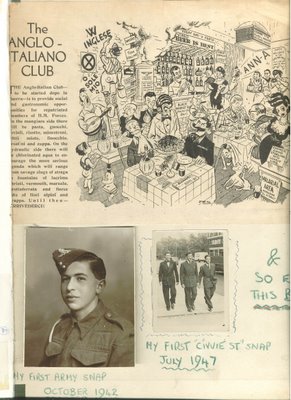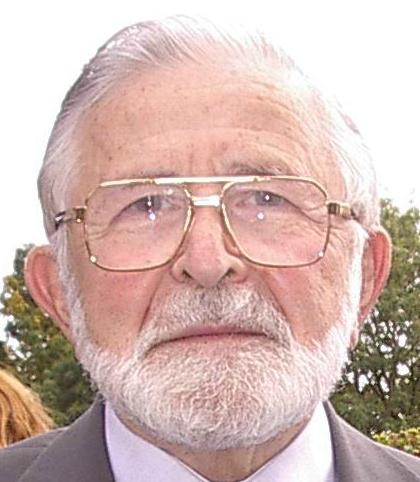
Tuesday, April 18, 2006
Page 49
Page 55
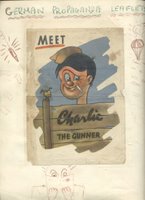
The reverse of this leaflet reads:
Charlie tells the truth!
Say, chums, here's a new voice! Of course, it's not your master's voice, but here come the thoughts of a soldier just like you! I'm no more than one of the millions of suffering soldiers in the world. I'm an Allied soldier !
I'm, so to say, the blank file in all your parades. I know what's what and I want to put your thoughts into words for you.
In short, I'm Charlie the Gunner!
Just now I want you to keep your brains clear, for in the coming weeks, the Big Show is timed to start on the Italian front. What do I mean? Hell, our officers are talking about large scale attacks against Jerry! Isn't that the limit?. Listen, in the East, the Red Army is about 40 miles from Berlin. In the West our Armies are
going forward along the Rhine. And we here in Italy? What are WE doing? We could of course wait till the bloody thing was. over, but no, we must get ready for new attacks!
That means heavy losses again and, for many pals, a single ticket to the devil !
The mountains here are not friendly and the Po is wide, deep, and very, very wet!
There can be only two possibilities.
You and I know that the battlefront here is of secondary importance. So either our Generals are taking a last chance to snatch a victory and make fame in military history, or our dear Winnie and Franklin Delano must have some victories to put up in San Francisco against "Good Old Joe"
At the last moment we must end our lives in Italian mud and dust. We could win this war without any great attacks in Italy! But our Commanders and our Government say: No! Ten thousand dead heroes more or less make no difference to us and we need them to balance our bill with Stalin's, when the “Golden Gate of Sail Francisco” is opened for the great Peace Conference on the first of April.
Sorry, boys, I made a slight slip about the date, it's the 2nd of April, not the first!
But what can WE do? We can't even raise our voices, against these Hero-makers!
So, come along boys, be quick about it and kick the bucket for them!
While the Golden Gate of San Francisco is opening to receive Winnie F.D.R. and St. Joe to the Great Conference which is to bring Peace on Earth to Men of Goodwill, the “Golden Gate of Heaven” will be opened for many of you by Good Old St. Peter, saying: “Come inside and choose your harp, You've had your share of Hell”
So, till next time! Yours
Charlie
Page 56
Page 57
Page 59
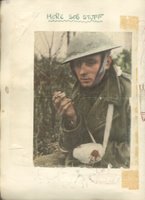
The reverse of this leaflet reads:
He also had been told
that the Germans are a horde of Huns and barbarians, posing as supermen and with only one idea, to bring all Europe under their tyranny of terror.
He also had been told
that it was the sacred duty of all liberty-loving men to free Europe from the bestial cruelty of these Nazis.
He also had been told
that in fighting against these Huns it was necessary to hold out to the last, as the Germans illtreat and even kill their prisoners.
The day came when he was taken prisoner.
The "Hun" who had captured him pulled out his first-aid kit, bandaged his wounded hand and gave him a cigarette.
The "Hun" who brought him to the dressing station gave him a drink from his own flask
and saw to it that hat he came under the doctor's care at once.
The "Hun" doctor who skilfully and gently extracted the splinter from his hand, gave him another cigarette and sent him off with a friendly pat on the back.
The "Hun" who brought him to the prisoners' camp knew a little English and told him and some of his pals all about his home and his family.
Then he understood
that all these German soldiers were neither Huns nor wild beasts nor did they pose as supermen. Thev were boys like his friends Bill, Fred and George, boys with the same claims on life as the English soldiers and, like them they were also fed up with war.
And so everything was quite different
from what his newspapers and wireless, full of hate-propaganda, had been dinning into his ears. He had been the victim of a swindle, for he knew well enough now from all the German soldiers he had met and learned to know, that they were incapable of committing the atrocities recounted daily by his papers. They wanted to live in peace and attend to their work, and for this it was necessary that the world should allow them the same rights as any other nation. They were fighting for these rights and would not cease fighting until they obtained them. But nothing was further from their thoughts than to wish to dominate Europe. On the contrary, OR their Eastern Front they were fighting the battle of this very Europe against the Asiatic hordes of the steppes beyond the Urals and the Caucasus, who, stirred up by Bolshevism, had attacked Europe with murder, violence and robbery. They would not be satisfied with the conquest of Germany alone, their goal was the revolutionising of the whole world. And while the Germans were fighting desperately against this onslaught,they were defending' not only their own lives but were fighting for Europe and also for England, for him. Bill, Fred, George, and for everyting that made life worth living.
And so he began to reflect!
If everything that the anti-German hate-propaganda was saying was untrue, if the truth was something quite different, then there must be someone with an interest in this senseless Slaughter, among the nations of Europe. There must be someone who profits by all the suffering and misery of war.
Who is it?
This is a question worth thinking over.
Page 60

The reverse of this leaflet reads:
His way leads safe home
True, it passes through a prison camp and no true soldier likes to be taken prisoner, a Briton as little as any other.
And, Bill was a good soldier and naturally he was fed up like all of us, but he was no coward.
But, Bill was also an intelligent soldier and as his reconnaissance party was spotted by Jerry and he and his pals were wounded by spandau fire, he saw that the situation was hopeless,and further resistance meant senseless suicide.
So, Bill did the only sensible thing he said “Goodbye to Arms” and gave himself up.
Then, Bill got to know Jerry.
Naturally he was not pleased to be falling into the hands of men whom his own leaders had always described as “beasts in human shape” but he would have to take his chance. The first Jerry whom he got know was one of the paratroops called Walter who promptly produced his field-dressing kit and bandaged his head, then gave him a drink out of his bottle and a cigarette, and finally putting Bill's arm around his shoulder brought him out of the front tines to the dressing station.
Bill felt he had found a pal in this quiet boy and he .was sorry when they had to part. He soon realised, however, that Walter was one of many, all helpful, friendly, decent chaps - young men with the same sorrows and joys and the same feelings as his own pals.
At last. Bill understood that his capture was a piece of good luck for him He got the chance to see behind the scenes and learn to know the^ much-abused Germans.
Besides, in many talks with English speaking captors, now friends, he very soon realised that German “Nazism” was hailed by the London war- mongers merely because they feared it might open the eyes of the English workers to their own plight under the old system, and lastly, and most important of all Bill knew that he was safe on the road to Home, sweet Home,
Page 62
Page 65
Page 66
Monday, April 17, 2006
Page 72
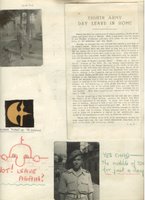
The tailboard of the Bedford three-ton truck slammed down with a resounding crash, someone yelled, 'Everybody out!', and we all clambered out stiffly on to the baking pavements of wartime Rome.
There were some 15 of us, all from the same Regiment, the 49th Light Anti-Aircraft Rgt. The time was 10am and we had just arrived after a bone-shaking three-hour journey from 75 miles north of the city.
The date was Wednesday, 21 June 1944. Rome had fallen to Allied troops 18 days earlier when the American General Mark Clark of the 5th Army had been given the honour of formally accepting the city's surrender. Six days later, on 9 June, my unit had driven through Rome on its way North and we had been there ever since, figuratively catching our breath while the powers that were decided what our next move was to be. Someone up top must have said, 'Give the troops a chance to see what they've been fighting for,' and I was one of those who had drawn a short straw.
I was not quite twenty-one at the time, had been in the Army since October '42 and abroad since April '43. I had arrived in North Africa just in time for the end of the First Army campaign, had been through the whole of the Sicily campaign and (in company with most of my comrades there that day) had been on the long slog north since the invasion of the Italian main land in September '43.
In my wartime album I still have some snaps taken on the day so I don't have to think too hard to remember what I must have looked like on this scorching day some fifty odd years ago. I was slim in build, dark from successive summers in the Mediterranean and wore khaki drill, as it was officially referred to. My shirt was open necked, sleeves rolled up to the regulation length and I wore blankoed gaiters over my boots.
On my right sleeve I wore a forked lightning badge to show that I was a wireless operator, and on my shoulders I wore the distinctive yellow battle-axe on a black background, which signified that I was part of the 78th British Infantry Division. My chest showed only one medal ribbon, that of the Africa Star and my pipe, a hangover from my civilian life, was clenched at what I obviously imagined was a jaunty angle.
As I've said, the time was 10.00 hours, we had to be back at the pick-up point at 18.00 hours and the Sergeant in charge left us in no doubt as to the likely trouble we would be in if we missed the bus. Back at the camp we'd been given a leaflet that told us of some of the glories we were about to see and printed on the back of the leaflet was a reasonably accurate, if not detailed, map.
I had no particular friends with me on that day, just the way the draw had worked out. This suited me fine however because even a cursory glance at the map had shown that I would have to go like the proverbial clappers to see even a tenth of what the city had to offer and what I had in mind for the day.
We had been dropped off at a lorry park near the Colosseum and so this was an obvious starting point. I followed the early crowds into the amphitheatre and tagged on to a group that had managed to secure the services of an Italian guide. After a short while I slipped away to visit the cells underneath the arena where the slaves and early Christians were held prior to the games and their subsequent death. I have never considered myself to be significantly claustrophobic but the atmosphere in the dank, shaded quarters felt unbearably evil, and I was glad to get back out into the sun and the heat.
Next stop was the nearby Forum where I wandered for a while before heading northward to the Victor Emanuel monument, known to the locals as the 'Wedding Cake' because of its garish architecture. Still heading north, I stopped for a while at the Pantheon and then the Trevi Fountain finally finishing up at the monumental steps of the Piazza di Spagna, where I rested in the shade and ate my haversack rations augmented by fruit and drink I bought on the spot.
It was now time to head west, crossing the Tiber for the first time over the Ponte San Angelo to the castle itself, no time to hang around here because the nearby Vatican beckoned and I pushed on relentlessly.
The Vatican was fantastic, all that I had expected, and I spent a few hours there armed with a guide book. It was almost 17.00 hours before I could tear myself away.
The last item on my mental itinerary for the day was to find the Great Synagogue and, if I could, some fellow Jews. In anticipation of such a meeting I withdrew from my wallet a small brass Magen David, which I had acquired somewhere along the way and I let it hang from the buttonhole of my breast pocket.
The map I had been using made no mention of the Synagogue but I had heard from a Jewish friend back at the unit that it was near the Isola Tiberina, the island that sits in the centre of the Tiber near the Campidoglio.
After leaving the Vatican I re-crossed the river at Ponte Vittorio Emanuel, and then turned right to follow the embankment south until, almost wilting in the heat, I saw the synagogue on my left. It was huge, Moorish in design, with a large domed roof. I walked completely round the outside until I found a small side door that looked as if it was in use. After knocking a few times an elderly man, obviously a caretaker, let me in, and when I explained I was Jewish he let me wander around un-escorted to study the interior. There were no worshippers present and the stained-glass windows and marble pillars were all too much reminiscent of the Vatican that I had just visited. It was certainly a far cry from the Bethnal Green Synagogue where I had been bar-mitzva'd less than eight years earlier!
After about twenty minutes I quit the cool interior to face the baking streets again after first asking the caretaker where I was likely to find other Jews. He told me to cross over the other side of the Tiber and ask any passers-by for the Jewish Quarter.
In the event it proved unnecessary because immediately I had crossed the Ponte Cestio I saw a small whitewashed garage facing the Synagogue. What drew my attention to it was a large Magen David (Shield of David) that someone had painted on its walls in black paint.
More than 50 years later I can still feel the mental blow to the pit of my stomach on seeing this crudely painted sign with all its obvious connotations and its reminder of the photographs I had seen of Jewish shops in Berlin in the late thirties.
I made my way into its dark interior and once my eyes had adjusted to the dark I saw a young man working on a car engine. 'Sono ebrei qui?' ('Are there any Jews here?'), I called into the darkness.
There was a pause and then back in Italian came, 'Why do you want to know?' This, in the most unfriendly of tones.
'Because I’m a Jew,' I replied, and gestured, as if for confirmation, to the Magen David that was now dangling from my breast pocket.
He came close, studied my face carefully, then the Magen David and then, all restraint aside, bear-hugged me as though we were brothers. He, I never knew his name, called out to someone deeper in the darkness who was old enough to be his father or his uncle and introduced me as 'Un soldato Inglese, ma Ebreo!' - an English soldier, but a Jew!
Soon others joined us and each newcomer was solemnly introduced.
'Are there any more Jews around here?" I asked.
My new friend laughed and said, 'Come, I'll show you!'
He wheeled out an ancient motor bike. I was invited to take the pillion seat, and we roared off along the banks of the Tiber.
We didn't have far to go because I soon realised I was back at the Vatican. He parked his bike and pushed me forward towards the stalls that were selling religious objects. He called out to one of the stallholders and within seconds I found myself in the centre of a swarming, back-slapping crowd of men women and children, who proceeded to treat me as if I had just personally liberated Rome.
The kids in particular were particularly interested in my presence and kept touching me as if to convince themselves that I was real. Their parents were content to fire non-stop questions at me, always ending with, 'Do you think the war will be over soon?'
I spoke to my guide and tapped my watch face. I had already told him on the way that I had to be back at the pick-up point for 18.00 hours and the time was flashing by.
He explained to the stallholders and then said to me, 'They want to give you a present (un ricordo),' and I could see that they wanted me to choose something from one of the stalls. The joke was that all of their merchandise was aimed to please good Catholics, and the numerous icons and crucifixes were hardly suitable gifts for this British Jew who was just about to leave them. The matter was soon resolved - one of the men pointed to my own Magen David still hanging from my shirt pocket. I took it off and handed it to him whereupon he promptly took a gold chain off one of the crucifixes and re-fixed it to my own charm.
A roar went up from the crowd - honour had been saved all round and as I hung my ‘ricordo’ around my neck and waved my good-byes I was choked with emotion.
My final call that evening was to another relative of my new found friend and as I drunk the obligatory glass of wine I listened to harrowing tales of what it was like to be a Jewish civilian in wartime Italy. I remember in particular their comments that life under Mussolini had been good even during the early days of the war, but that the horrors had started once the Germans had taken control in September '43.
It was 17.30. I apologised to my hosts that I really must be on my way and we solemnly shook hands. My guide and I roared away into the gloom and with about ten minutes to spare I was back at the lorry park and looking for my transport.
Later, as our ‘passion-wagon’ drove off into the darkening night, in the back of the truck it was noisy as everyone compared notes of how they had spent the day.
There were of course the inevitable tales of booze-ups and female conquests although to be fair to my comrades of fifty years ago there were many there that evening who had obviously also enjoyed sights and experiences that they too would cherish for a lifetime.
For whatever reason, I didn't tell the others about my own day, at least I said nothing about my meeting with fellow Jews and as the truck roared noisily northward, taking me back into the cocoon of life within a British army unit, I consoled myself with the thought that one day I would write it all down
Page 74
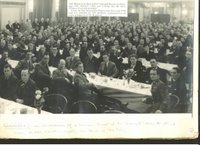
On the 19th of October 1946, my regiment, the 4th Queen’s Own Hussars, held its first post-war reunion, the last having been held in 1938.
As our Honorary Colonel, the Rt.Hon.Winston Churchill, was considered as having played no small part in the allied victory, it was considered that the regiment was entitled to ‘do him proud’ and the necessary arrangements were made to celebrate the event. Churchill, like his son Randolph, had actually served in the Regiment.
Apart from some 340 ex-servicemen who had already been de-mobbed it was decided to send home from Italy no less than 20 representative serving soldiers and I was one of the lucky chaps who’d been chosen.
I see from my album that we left Monfalcone on the Wednesday, got into London on Friday evening and turned up at the dinner on Saturday. By Monday we were on our way back, arriving back at camp on Wednesday evening. Of course I was able to fit some time in at home, and the dinner itself, held at the Connaught Rooms in Holborn, with Winston Churchill in attendance, was quite an experience.
After the meal the catering staff were ushered from the hall and Winston, having obviously enjoyed his meal and a few drinks, told us a few rather ‘blue’ jokes which were very well received by his audience
In the photo above Churchill is fourth from top left, I am over on the top right, marked with an arrow.
Sunday, April 16, 2006
Sunday, March 12, 2006
Friday, March 10, 2006
Page 85
Page 87
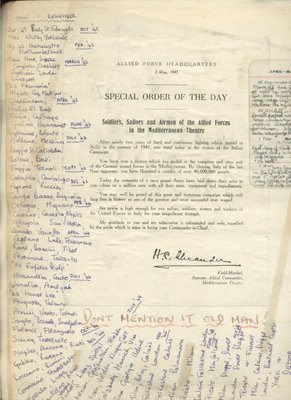
Sunday 29th. April 1945 *
Move off due to ops going so well up North. Musso has been bumped off. Received some mags. Captain Walmsley reckons the Regiment has 'had it'.
Monday 30th. April 1945
Still in same field. Small parcel arrives from home containing 'Dr.Goldstein's
Medicine'. Strawberries & Cream for dinner. Film show in barn was George
Raft's "Follow the boy".
May 1945
Tuesday 1st. May 1945
Last day of tank cooking. Played cards in bivvie with Vic & Hewie. Taught
them 'Oh Hell'
Wednesday 2nd. May 1945
Jerry threw his hand in in Italy & Austria. Fired all our 2" mortars,
phosphorous bombs & verey lights & had bonfires all over the shop.
Cease fire about 11 pm.
Page 90 Inside back cover
Subscribe to:
Posts (Atom)
